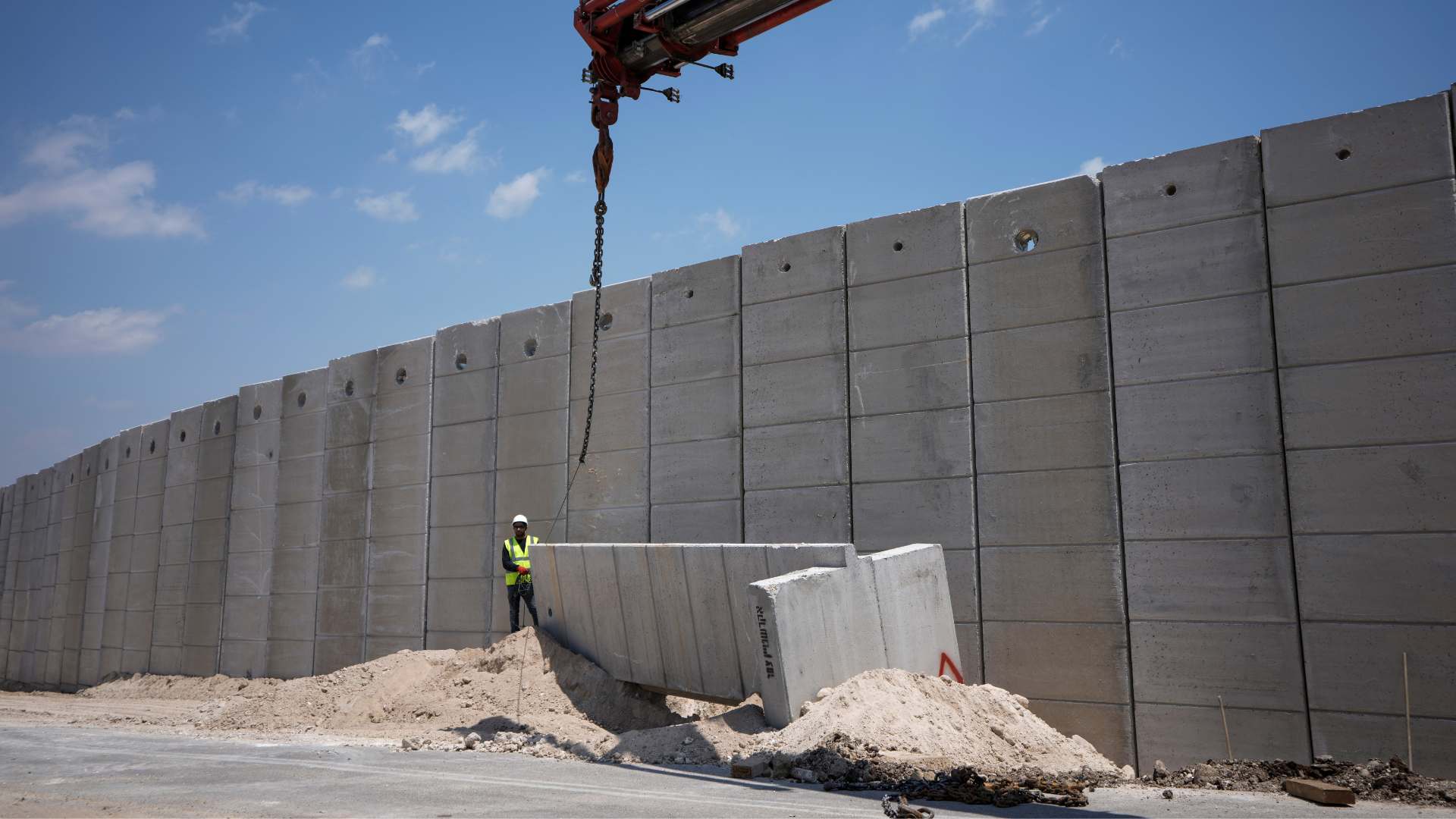Despite the failure to achieve even substantial cease fires in Israel’s war with Hamas, there are people who still think lasting peace is possible.

Workers place sections of a nine-meter (30-foot) high concrete wall to replace a border fence between the northern West Bank and Israel, near the Arab village of Salem in June 2022. (Credit: AP Photo/Ariel Schalit)
This article was produced exclusively for News Decoder’s global news service. It is through articles like this that News Decoder strives to provide context to complex global events and issues and teach global awareness through the lens of journalism. Learn how you can incorporate our resources and services into your classroom or educational program.
In the three months since the latest explosion of violence in the Middle East, activists on both sides of the Israeli-Palestinian divide have been working to keep alive the goal of a lasting peace.
In seminars, chat rooms and articles published at home and abroad, they have doggedly continued to promote ideas for a formula that could break the decades-old cycle of conflict.
One thing they seem to agree on: Any settlement must guarantee the full national rights and security of both communities, as enshrined in United Nations resolutions in favour of a two-state solution.
But how to get there after previous initiatives have foundered on the intransigence of one or other side?
One long-overlooked concept that is now being revived is for a future confederation of independent Israeli and Palestinian states that would focus on the shared interests of the two nations rather than on their separation.
Shared interests between longtime foes
It might sound like an idealistic pipe dream at a time when faith in the viability of any version of a two-state solution, anticipated in the 1993 Oslo Accords between Israel and the Palestine Liberation Organisation, is rapidly fading.
So how do its promoters explain their philosophy and underlying principles?
Israeli-Palestinian activist group A Land for All believes that the two peoples can live in two independent states that share one homeland.
Instead of focusing on establishing hard borders and segregation, it is argued, a confederal arrangement would foster mutual cooperation.
And how would such a system work?
Opening the borders
The first requirement would be for the establishment of a sovereign, democratic Palestinian state within defined borders on the basis of it entering simultaneously into a confederal arrangement with its Israeli neighbour.
Borders would be open to citizens of both states, who would have the right to travel to, and even live and work, in the territory of their neighbour as long as they accepted its sovereignty and laws.
Israelis and Palestinians would vote in their own national elections according to their citizenship rather than their location.
In practice, Israeli citizens would be able to remain in what would become Palestinian territory in the West Bank, while Palestinians would be free to pursue work and opportunities in Israel. The establishment of a common economic zone would target the existing economic inequality between Israelis and Palestinians.
The model reflects that of the European Union, whose citizens benefit from freedom of movement and residence among partner states that continue to enjoy national sovereignty.
The two states would cooperate on security, while the rights of the citizens of both would be protected by a court of human rights.
Jerusalem would have the status of an open city and serve as the capital of the two nations, a reflection of its current mixed cultural and religious makeup.
The confederation concept is not one confined to a naively utopian fringe.
A union of European states brought together longtime enemies.
Outlining its principles last year, before the latest descent into violence, two former peace negotiators, Palestine’s Hiba Husseini and Israel’s Yossi Beilin, said the confederal model aimed at developing a common historical narrative for the two peoples.
They envisaged a future in which “both peoples will be able to feel that the other country is not ’foreign’ to them and that they have easy access to places to which they feel a historical, religious, cultural or familial connection.”
In a contribution to a December article for the New York Times outlining a variety of options on the elusive path to peace, two Israeli analysts associated with the Land for All movement acknowledged that the road to realising their vision would be a long one.
May Pundak and Dahlia Scheindlin wrote that Gaza would first need to be reintegrated with the West Bank to correct a failed policy of isolating it.
Palestinians would need a unified, accountable government to represent them, while both sides in the conflict would need to reject political extremists and commit to political rather than military solutions.
They argued that it was time to acknowledge that complete separation of the communities had failed as an aim of the peace process up until now.
“The two sides have never agreed on a peace deal based on separation, because they don’t want one,” they wrote. “It’s time to replace separation with partnership.”
Questions to consider:
- How could a confederation between Israel and Palestine work?
- What do you think are some obstacles preventing this kind of solution from happening?
- Do you believe that long time hatreds can be overcome?

Harvey Morris was a foreign correspondent for Reuters, The Independent and Financial Times. He covered revolutions, wars, politics and diplomacy in the Middle East, Europe, Africa and North and South America in more than 40 years as a journalist. He did on-the-ground reporting of the Iranian, Portuguese, Nicaraguan and Romanian revolutions, three Iraq wars, Argentina’s ‘dirty war’, the 1982 Israeli invasion of Lebanon and two Palestinian intifadas. He has written three books on the Middle East and is co-author, with John Bulloch, of the 1992 “No Friends But the Mountains: The Tragic History of the Kurds”. Morris writes an entertaining blog, “Idle Thoughts on London Walks“.
